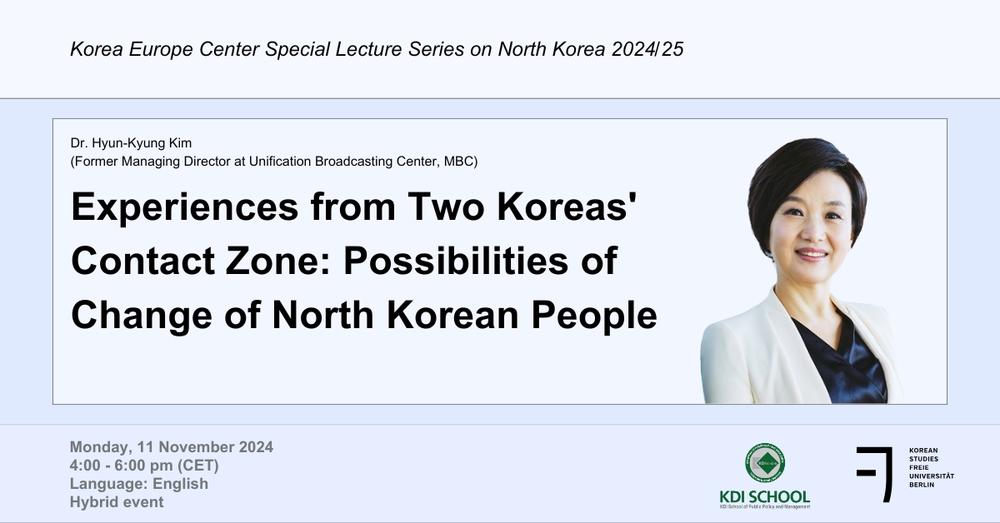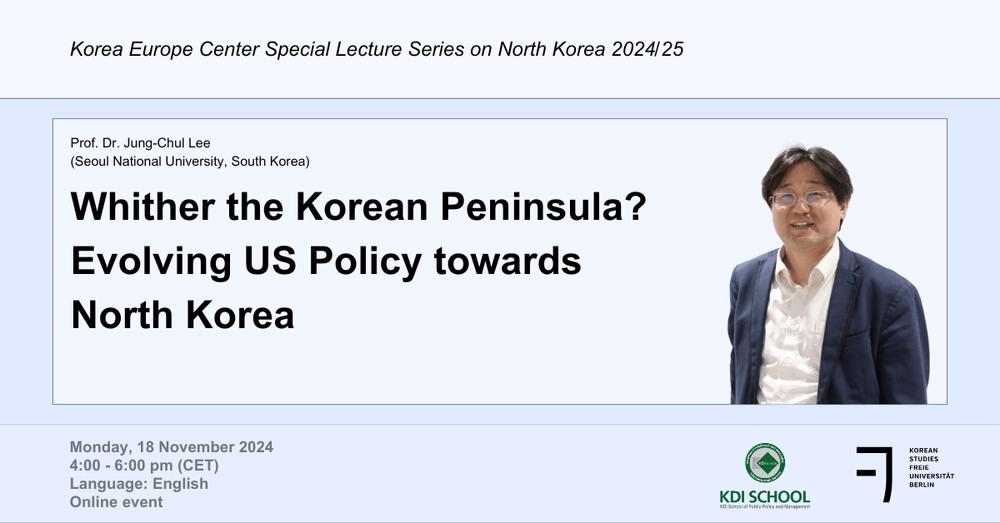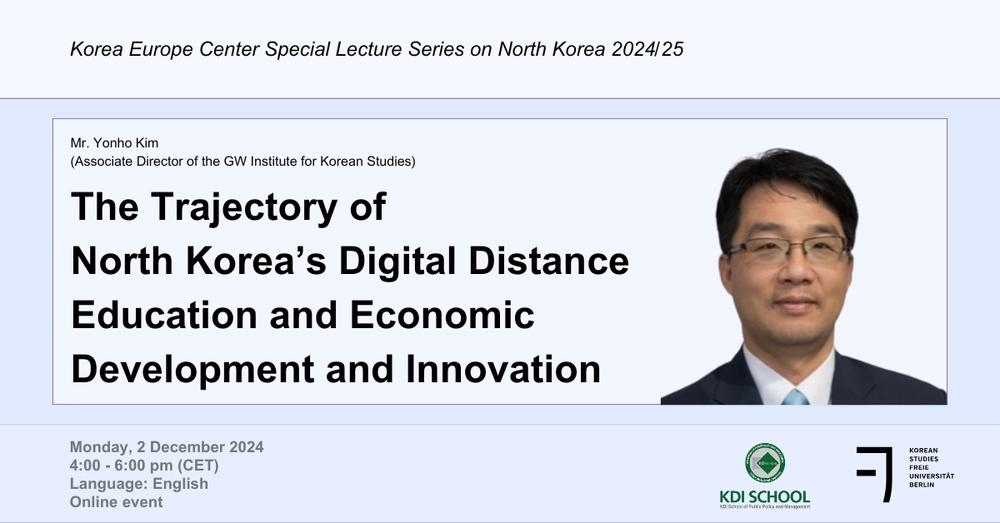KEC Special Lecture Series on North Korea 2024/25
The Korea-Europe Center is pleased to invite you to the Special Lecturer Series on North Korea.
1) 11 November 2024
About the lecturer:
Dr. Hyun-Kyung Kim (Former Managing Director at Unification Broadcasting Center, MBC)
Hyun-Kyung Kim worked as a journalist at MBC, one of the major Korean broadcasting companies, for 38 years. She spent most of her career as a correspondent for the Ministry of Unification of the Republic of Korea and as an analyst specializing in North Korean affairs. She served as the producer and anchor for MBC's North Korea-focused TV program, "Observatory for Reunification(통일전망대),” and made 25 reporting trips to North Korea, producing joint projects as well. Currently, she teaches North Korean Media at the University of North Korean Studies, where she earned her Ph.D. Her dissertation is 'From Preparation to Execution: Discourse Strategy over Kim Jong Un’s Succession in North Korea.'
Abstract:
This lecture shares the experiences of a journalist who visited North Korea 25 times over 20 years of exceptional inter-Korean exchanges. During this time, North Koreans met South Koreans—viewed as enemies—and engaged in business, sharing common interests. Contact with the outside world sometimes shocked and confused the North Korean people, but it was also seen as an opportunity for prosperity and hope. We will uncover unknown aspects of North Korean society and explore its potential for change.
2) 12 November 2024
KEC Special Lecture Series on North Korea - Prof. Dr. Jung-Chul Lee (Seoul National University, South Korea)
About the lecturer:
Prof. Dr. Jung-Chul Lee (Seoul National University, South Korea)
Dr. Jung-Chul Lee is a Professor in the Department of Political Science and International Relations at Seoul National University, concurrently serving as the Chief of the Center for Unification Studies at IPUS (Institute of Peace and Unification Studies, SNU). Before embarking on his research year, he held positions as the Deputy Director of IPUS and Chair of the Interdisciplinary Program for Peace and Unification Studies at SNU. Professor Lee has contributed as a policy advisor for the Ministry of Unification and various other government departments of the Republic of Korea. He also served as an auditor at the Korea Institute for National Unification (KINU) and as a member of the Advisory Group to the Speaker of the National Assembly of the ROK. He currently holds the position of absentee director at the Defense Agency of Technology and Quality. Professor Lee has authored numerous books and articles on North Korea and its nuclear issues, including “Kim Jong-un’s Foreign Policy: A Revisionist State, an Alliance with China or a Third Way?” (book chapter, 2022), “Sanctions for Nuclear Inhibition: Comparing Sanction Conditions between Iran and North Korea” (Asian Perspective, 2019), and “Making Sense of North Korea: How to Respond to Pyongyang’s Charm Offensive,” (Foreign Affairs, 2015).
Abstract:
This lecture examines recent shifts in U.S. policy toward North Korea under the new administration. During the Biden administration, the U.S. adopted a stance often referred to as "Strategic Patience 2.0," or a "none-for-none" approach—essentially a non-engagement policy with North Korea. As is widely known, North Korea has recently deployed its forces to the Donbas region, strengthening its military alliance with Russia. In response, South Korea and the U.S. have expressed strong criticism and are reportedly preparing countermeasures. This evolving situation prompts the question: will a new crisis emerge on the Korean Peninsula? This lecture aims to provide a comprehensive understanding of the potential implications of these developments.
3) 02 December 2024
About the lecturer:
Mr. Yonho Kim (Associate Director of the GW Institute for Korean Studies)
Mr. Yonho Kim is the Associate Director of the GW Institute for Korean Studies (GWIKS) and an Associate Research Professor of Practice. He oversees GWIKS’s Korea-related policy programs—Korea Policy Forum, North Korea Economic Forum, and GWIKS North Korea Program—fostering knowledge-sharing and network-building among experts and policymakers in Washington, Seoul, and beyond. As part of his broader portfolio, he serves as the editor for GWIKS’s flagship publication, NKEF Policy and Research Paper Series, and the US-ROK Policy Brief.
He specializes in North Korea’s digital transformation and U.S. policy towards North Korea. Kim is the author of several significant works including North Korean Phone Money: Airtime Transfers as a Precursor to Mobile Payment System (2020), North Korea’s Mobile Telecommunications and Private Transportation Services in the Kim Jong-un Era (2019), and Cell Phones in North Korea: Has North Korea Entered the Telecommunications Revolution? (2014).
Abstract:
North Korea launched its digital distance education program in the early 2000s, marked by Kim Jong Il’s direct involvement. Up until two months before his death, he provided on-site guidance, promoting the use of science and technology databases in e-libraries. Real-time online lectures became available to factory workers through Kim Chaek University of Technology as early as 2007. Under Kim Jong Un, these services expanded significantly, with key universities designated as centers for online education across fields such as machinery, light industry, construction, chemistry, and medicine. The Science and Technology Complex in Pyongyang now connects its extensive database to local e-libraries and Science and Technology Distribution Rooms in factories and enterprises nationwide. This system aims to bridge educational gaps across regions, schools, economic sectors, and production units. The COVID-19 pandemic further underscored the importance of digital distance education, accelerating the adoption of North Korea’s information technology-based education model.
Moderator: Dr. Hojye Kang
Time & Venue:
Monday, 11st November 2024 - 02nd December 2024
Online:
Webex
Weitere Informationen
Dr. Hojye Kang: hojye.kang@fu-berlin.de



